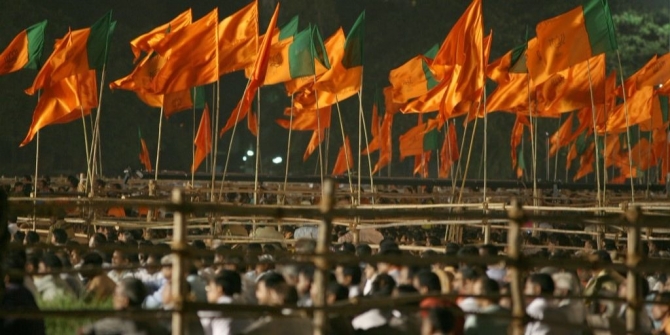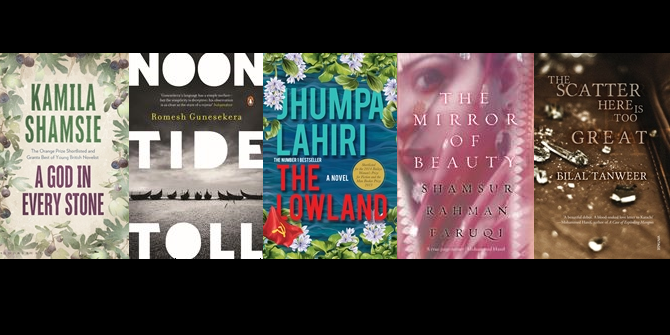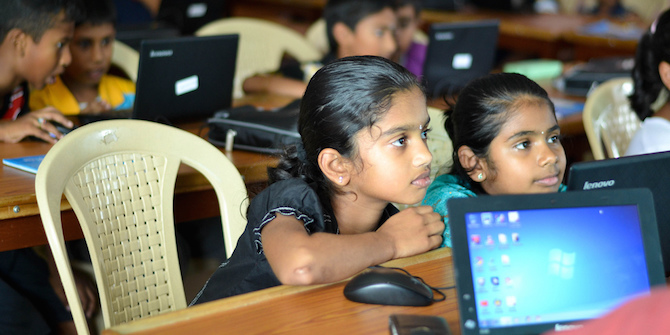 The Southbank Centre’s Alchemy Festival last month featured a concert in tribute to Sabeen Mahmud, a Pakistani activist and champion of cultural expression who was murdered in Karachi in April. Marielle Velander attended the event, and here highlights Sabeen’s contribution to the arts scene, as well as the excitement and vibrance of the performance itself.
The Southbank Centre’s Alchemy Festival last month featured a concert in tribute to Sabeen Mahmud, a Pakistani activist and champion of cultural expression who was murdered in Karachi in April. Marielle Velander attended the event, and here highlights Sabeen’s contribution to the arts scene, as well as the excitement and vibrance of the performance itself.
“Dil Phaink” means to throw your heart out into the world, and that is exactly what a team of Pakistani activists, musicians, artists, and writers, have done in composing the art installation showcased at the Southbank Centre’s Alchemy Festival 15-25 May. For a period of 10 days, the Queen Elizabeth Hall was transformed into a celebration of South Asia’s colors, light, and hope through montages of its famed truck art, pop culture, and cult cinema. Through this vibrant homage to the Pakistani spirit, the artists celebrated and investigated the complex words and colors that make up Pakistani identity at a time when the media so often paints the country in darker hues.

The installation came to a head at free a concert on Thursday, 21 May. The concert, delivered by members of one of Pakistan’s most popular bands, Overload, included singer Farhad Humayun, dhol player Nasir Sain and guitar player Aziz Ibrahim. The concert was organised in tribute to Sabeen Mahmud, a Pakistani human rights activist shot outside The Second Floor (T2F), the community space and bookstore she founded in Karachi, on 24 April by anonymous assailants. She had opened T2F in 2007 with the dream of creating a safe haven for cultural expression in Karachi, and it quickly grew to be the go-to venue for concerts, book readings, and intellectual discussions in Karachi’s arts scene. People and events deemed “high risk” were frequently hosted at the venue. It was shortly after a discussion at T2F about conflict and human rights abuses in the Pakistani province of Baluchistan that she was shot. After her passing the hashtag #IamSabeen gained popularity on Pakistani twitter feeds and raised debate about why she was targeted and by whom, as well as the important contributions she made to Pakistani civil society.
PeaceNiche is the for-profit organisation managing T2F, and in Sabeen’s absence, arranged the Dil Phaink installation for the sixth annual Alchemy Festival, which highlights the relationship between the Indian subcontinent and the UK through music, dance, art, debate, film, literature, fashion, theatre, and food.

As famous Indian tabla player Zakir Hussain began his sell-out concert in the Great Festival Hall next door, London’s Pakistani community crowded into Queen Elizabeth Hall, bringing family and friends of all ages. Some blonder heads (including mine) were present too. As anticipation rose above the familiar delay in starting, an announcement was made that Dil Phaink’s event cannot start until the concert next door has finished. I converse with the Pakistani gentleman sitting next to me, who came to London 10 years ago to help support his seven sisters back in Karachi, and he tells me about the phenomenal contemporary music scene in Pakistan and how his passion for astronomy results in a complicated relationship with his homeland.
Finally, with a dramatic stroke of Aziz’ guitar and Farhad’s voice soaring above the quieting crowd to a familiar qawwali melody, the concert begins. Behind the small stage are signs in Urdu and some walls are lined with posters saying “Pyaar hone dein” (Let there be love), used in Sabeen Mahmud’s counter-campaign to the religious fundamentalists’ “say no to Valentine’s Day” propaganda. Farhad alternates between singing with his powerful voice at the microphone, and letting his creative energy flow at the drum set, while the Lahori dhol player keeps the powerful beat in his pink sequined robe and wavy locks, and the guitarist Aziz strums his guitar with remarkable finesse. All three of the men on stage play with energy and passion that could fill up a stadium. The large room heats up with movement and joy as the musicians play “Bijli Aye na aye”, a wedding song about the frequent power cuts of the subcontinent that was featured in the Mira Nair film “The Reluctant Fundamentalist”. At one point a short stout man in a turban and colorful costume, wearing 3D glasses and a cheeky grin, comes dancing in among the audience and the Pakistani man next to me exclaims, “I’ve met that man at Notting Hill Carnival”. More and more people in the audience are standing and clapping to the beat reverberating through the packed hall.
After performing Overload’s most famous Punjabi song, “Neray Aah” which was recorded on the lauded music programme Coke Studio Pakistan in 2012, every audience member is standing and Farhad announces “You know what, I really want to play some drums.” For the next half hour, the sound of the drum set, dhol, and electric guitar drive the multi-generational audience to reverie. By the end of the night, the Pakistani audience crowds around a wall painted to resemble the exterior of a Karachi residence, to write messages in Urdu and English to Sabeen with black and green markers.
As the event-goers spill out into the London night, it truly feels like these Pakistanis, from the organisers to the musicians to the audience, have thrown their heart out into the world. I leave feeling hopeful for the sense of purpose and indomitable optimism of the Pakistani arts scene.
Note: This article gives the views of the author, and not the position of the South Asia @ LSE blog, nor of the London School of Economics. Please read our comments policy before posting.
About the Author
 Marielle Velander is an LSE Masters candidate in Anthropology and Development with a specific interest in water issues in South Asia. Before starting at LSE she spent the summer in Lucknow studying Urdu intensively as a recipient of the U.S. State Department Critical Language Scholarship. She tweets @mariellewel.
Marielle Velander is an LSE Masters candidate in Anthropology and Development with a specific interest in water issues in South Asia. Before starting at LSE she spent the summer in Lucknow studying Urdu intensively as a recipient of the U.S. State Department Critical Language Scholarship. She tweets @mariellewel.







